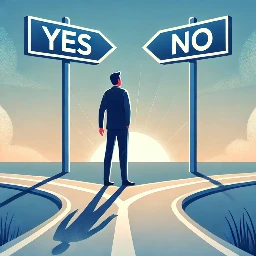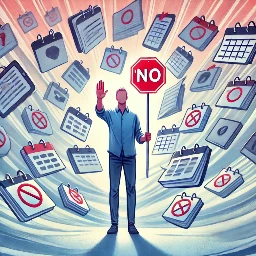In a world that constantly demands our attention, energy, and time, learning the magical power of saying no is one of the most transformative skills anyone can develop. Saying no isn’t merely about turning down requests—it’s about taking back control of your life, establishing boundaries, and focusing on what truly matters.
This powerful word, often underestimated, can significantly enhance both personal growth and professional success. In this blog post, we’ll delve deep into the importance of saying no, how it affects every aspect of our lives, and why mastering this skill can be your secret to happiness and success.
Why Saying No is So Hard
Let’s face it, many of us struggle with saying no. It often feels like we’re disappointing someone, missing out on an opportunity, or worse, being rude. However, the inability to say no is a surefire way to overcommit, burn out, and lose focus on what truly matters.
Society has conditioned us to believe that saying yes is a virtue. From an early age, we’re taught to be helpful, agreeable, and accommodating. As a consequence, we frequently say yes, even when it compromises our own well-being. This is where the key to personal freedom lies: knowing when and how to say no.
The Magical Impact of Saying No

The real magic of saying no lies in its power to liberate you. By refusing the things that drain your energy or distract you from your goals, you open up space for what truly matters. Whether it’s time with family, working on your passion project, or even just resting, saying no gives you the ability to prioritize and focus on what’s important.
Here are the key areas where the power of saying no can significantly impact your life:
-
Personal Boundaries
Saying no is a crucial aspect of establishing boundaries, as they safeguard your energy, mental well-being, and time. When you set clear boundaries by saying no to things that don’t align with your values, you send a message to yourself and others that your time is valuable.
Personal boundaries help you prevent burnout, stress, and resentment. For example, declining to work overtime when it’s not necessary allows you to maintain a healthy work-life balance.
-
Increased Focus and Productivity
Learning to say no allows you to direct your energy toward the most important tasks. Productivity doesn’t come from doing more; it comes from doing what matters most. When you say no to distractions and unnecessary commitments, you have more time and mental clarity to focus on your goals.
This is especially important in a professional setting, where saying no to additional tasks or meetings can increase the quality of your work.
-
Better Mental Health
Constantly saying yes to things that don’t serve you can lead to overwhelming stress and anxiety. On the other hand, saying no reduces your mental load, giving you more space to breathe and relax. The act of saying no itself can be empowering, helping you to assert your needs and take control of your emotional well-being.
-
Enhanced Relationships
It might seem counterintuitive, but saying no can actually strengthen relationships. When you agree to things you don’t really want to do, it can breed resentment over time. In contrast, being honest and assertive about your limits fosters mutual respect. When you communicate clearly and respectfully, people understand that your no isn’t personal, but rather a way to maintain balance in your life.
-
Fulfilling Your Goals
Every time you say yes to something unimportant, you are effectively saying no to your goals. Success in any field requires a laser focus, which means you need to protect your time fiercely. Saying no to distractions, irrelevant projects, or social obligations allows you to invest more energy in achieving your personal and professional aspirations.
When to Say No

Now that we understand the magical power of saying no, the next step is knowing when to use it. Here are situations where you should consider saying no:
When it doesn’t align with your values: If the request goes against your personal beliefs or values, saying no is the best way to stay true to yourself.
When you’re overcommitted: If your schedule is already full, taking on more responsibilities will only lead to stress. Saying no in these cases helps you avoid burnout.
When it doesn’t move you toward your goals: If an opportunity doesn’t contribute to your long-term goals, politely decline it to focus on what matters most.
When your mental health is in jeopardy: There are times when it’s essential to prioritize rest and self-care. If saying yes to something jeopardizes your mental well-being, it’s time to say no.
How to Say No Politely (Google play store ) and Effectively
Saying no doesn’t have to be harsh or hurtful. Here’s how to decline requests respectfully while maintaining your relationships and professionalism:
-
Be direct but polite
Instead of offering vague excuses, be clear and direct in your response. For example, “I appreciate the offer, but I won’t be able to commit to that right now.” This approach shows that you value the person’s request but have a legitimate reason for declining.
-
Offer alternatives
If possible, suggest an alternative that might help the person without requiring your involvement. For example, you could recommend someone else for the task or offer resources that could assist them.
-
Use a positive tone
Even when saying no, you can maintain a positive tone. For example, “Thank you for thinking of me for this project, but I’m unable to take it on at this time.”
-
Don’t feel the need to over-explain
You don’t owe anyone a lengthy explanation for why you’re saying no. A simple “I’m unable to commit to that right now” is often enough.
-
Stand firm
Sometimes people will push back, trying to convince you to change your mind. It’s important to stand firm in your decision and remember why you’re saying no. A polite but firm “I understand, but my answer remains the same” will help reinforce your boundaries.
The Role of Self-Care in Saying No

Saying no is an integral part of self-care. By refusing to overextend yourself, you create the time and space necessary for your own mental, emotional, and physical well-being. Self-care isn’t just about pampering yourself with spa days or bubble baths—it’s about protecting your energy, setting limits, and ensuring that you have enough left to take care of yourself.
Saying no gives you the freedom to pursue activities that nourish your soul, whether that’s spending time with loved ones, working on a passion project, or simply resting. When you prioritize self-care by saying no, you’re able to show up as the best version of yourself in every aspect of your life.
Common Myths About Saying No
Many of us believe that saying no will result in negative consequences, but that’s not necessarily true. Here are a few common myths about saying no and the truth behind them:
Myth: Saying no makes you selfish.
Truth: Setting boundaries is a form of self-care, not selfishness. You can’t pour from an empty cup—taking care of yourself allows you to be more present and helpful to others in the long run.
Myth: Saying no will harm relationships.
Truth: In most cases, people will respect your honesty. They may even appreciate your clarity and assertiveness, as it helps manage expectations.
Myth: Saying no limits opportunities.
Truth: Saying no to irrelevant tasks creates space for opportunities that align with your values and goals.
Conclusion: Embrace the Power of Saying No
The magical power of saying no lies in its ability to give you control over your life. It’s about making deliberate choices that align with your goals, values, and overall well-being. Saying no allows you to protect your time, energy, and mental health, leading to greater focus, productivity, and happiness. When you master the art of saying no, you’ll find that it opens doors to personal freedom, better relationships, and a more fulfilling life.
At bloggingthinker.com, we believe that personal growth starts with making empowered decisions—and saying no is one of the most powerful choices you can make. Start practicing this magical skill today, and watch how it transforms your life.




